I was a pastor for five years. I loved (almost) every minute of it. Many days, I still miss it …
One of the things I enjoyed most was studying and preparing for my Sunday sermon. I tried as hard as I could every single week to prepare something fresh, insightful, and helpful for the people who attended on Sunday morning.

On average, it took me about 10 hours to prepare a 40 minute sermon. I would usually begin by translating from the Greek, outlining from my translation, then analyzing each word and phrase in the text, all the while praying for insight and help from the Holy Spirit to illuminate my mind and provide ways to explain the text and apply it to the lives of those who listened. My very last step was to read all the commentaries I had on that particular passage. There were numerous times where this final step forced me to madly rewrite my entire sermon from scratch …
Anyway, I have noticed an interesting trend on my blog during the last year. I always get a spike in traffic on Saturdays. For most of the time, I thought, “Well, it’s just because it’s the weekend, and people are surfing the internet more.” Also, Saturday is the day I send out my weekly blog digest to newsletter subscribers. So I thought that maybe I get some subscribers clicking over to my blog to read some of the posts they had missed during the week.
But then a few weeks ago I decided to dig a little deeper to find out why my traffic spiked on Saturdays.
You want to know why?
It’s my “Sermon” pages. On Saturdays, my sermon pages gets hundreds and hundreds of hits. A few weeks ago, for example, my sermon on James 2 got nearly 600 pageviews. There are a variety of possibilities for why my sermon pages are so hot on Saturdays, but I have a sneaking suspicion that the traffic comes from pastors around the world who are looking for a sermon to preach on Sunday. Who knows … maybe Mark Driscoll has preached one of my sermons? Ha!

If pastors are preaching my sermons, I don’t really care … I am glad to help out. I do wish, however, that once or twice a pastor who lifts a sermon from someone else would give credit to that “someone else.” Or leave a comment saying, “Thanks for the great sermon! I’m going to preach it in my church tomorrow!”
I do, by the way, get several emails a week from authors who want to quote something I have written in one of their books. I always tells them “Yes!” and thank them for asking. They also, of course, state that they will include my name and details in a footnote. Great! That’s how it should be done.
Or course, I will admit it. I confess. I have lifted sermons from other pastors. Two or three of them, I think. One from John MacArthur. One from Jon Courson. I don’t remember the other. But I always, always, always, made sure to make a disclaimer at the beginning of my message that the sermon they were about to hear was from another pastor, and the reason I am sharing it from the pulpit is because I thought the message was so good.

On a related note, I recently listened to a pastor preach a sermon on “The Widow’s Mite.” I cannot prove it, but what he said sounded eerily similar to what I wrote here about the Widow’s Mite. I used a source to get my ideas for that post (and that source is referenced in the post), so it is quite possible that this pastor never read my post and simply preached a similar idea, or maybe he read the same book I did … but regardless, the pastor never once gave credit to the books or blogs where he obtained his ideas. Of course, you cannot really include footnotes in a spoken sermon, so maybe the references were in the sermon notes?
I don’t know why I’m posting this …
Here’s my point, I suppose. If you “borrow” someone else’s sermon from online to preach on Sunday morning, at least leave a “thank you” comment on the website or give the person some credit in your sermon.
Do I sound bitter? I hope not. I really don’t care too much if another pastor preaches my sermons. I study hard and try to explain Scripture as best I know how, so if others preach my sermons, that’s okay with me. It’s just that a little thanks every now and then would be nice.





 On the one hand, there are countless numbers of people who think they received eternal life when they walked an isle at a revival or evangelism crusade. Or maybe they signed a card, raised a hand, or said a prayer. If you ask someone how they know they have eternal life, and they say something like “When I was 10 my church had a guest evangelist come speak, and when he gave an altar call I went forward and prayed the sinners prayer” it is possible that this person does not actually understand what the Bible says about how to receive eternal life.
On the one hand, there are countless numbers of people who think they received eternal life when they walked an isle at a revival or evangelism crusade. Or maybe they signed a card, raised a hand, or said a prayer. If you ask someone how they know they have eternal life, and they say something like “When I was 10 my church had a guest evangelist come speak, and when he gave an altar call I went forward and prayed the sinners prayer” it is possible that this person does not actually understand what the Bible says about how to receive eternal life. But through all these emotions and feelings, remember this: God loves you more than you can possibly imagine. Though what you are going through right now is extremely painful, God is with you in this time and is seeking to strengthen and solidify your faith during this time. You are experiencing a winter in your relationship with God, a time that some have called “the dark night of the soul.” But spring will come. The light will dawn once again. The sense of God’s presence will return.
But through all these emotions and feelings, remember this: God loves you more than you can possibly imagine. Though what you are going through right now is extremely painful, God is with you in this time and is seeking to strengthen and solidify your faith during this time. You are experiencing a winter in your relationship with God, a time that some have called “the dark night of the soul.” But spring will come. The light will dawn once again. The sense of God’s presence will return.


 Last month I spent several days reading, editing, revising, and arguing with myself about the 100,000 words I had written.
Last month I spent several days reading, editing, revising, and arguing with myself about the 100,000 words I had written.

 I probably should have clarified that Malachi was written primarily to the religious leaders of Israel, but not only to them. As the spiritual leaders, they were the spiritual representatives for Israel, and so naturally, Israel followed their lead. So Malachi 3:6 does mention the sons of Jacob, which may refer to all the people of Israel. Although even then, the statement in Malachi 3:6 is not so much about the actions of the son of Judah, but God’s long-suffering grace upon them. I read this verse as saying that God does not consume the sons of Jacob for the actions of the priests (or of the forefathers – Malachi 3:7). God is patient and long-suffering, and keeps His Word.
I probably should have clarified that Malachi was written primarily to the religious leaders of Israel, but not only to them. As the spiritual leaders, they were the spiritual representatives for Israel, and so naturally, Israel followed their lead. So Malachi 3:6 does mention the sons of Jacob, which may refer to all the people of Israel. Although even then, the statement in Malachi 3:6 is not so much about the actions of the son of Judah, but God’s long-suffering grace upon them. I read this verse as saying that God does not consume the sons of Jacob for the actions of the priests (or of the forefathers – Malachi 3:7). God is patient and long-suffering, and keeps His Word.

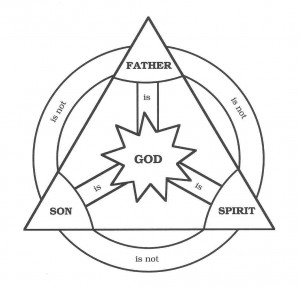 First, the Trinity is best defined as “One God who exists in three persons.” There are not three Gods. There is only one God. But somehow, in ways beyond human comprehension, God exists in three persons, the Father, the Son, and the Holy Spirit.
First, the Trinity is best defined as “One God who exists in three persons.” There are not three Gods. There is only one God. But somehow, in ways beyond human comprehension, God exists in three persons, the Father, the Son, and the Holy Spirit. Other monotheistic religions which have no concept of the Trinity have great trouble explaining or understanding how God could be loving and relational. Why? Because for most of God’s existence, there was no one to love other than himself.
Other monotheistic religions which have no concept of the Trinity have great trouble explaining or understanding how God could be loving and relational. Why? Because for most of God’s existence, there was no one to love other than himself.

 When most people ask this question, they are primarily referring to the “400 years of silence” in between Malachi and Matthew. I will try to explain what was going on during those years, but really, the question of God’s so-called “years of silence” is much more complex.
When most people ask this question, they are primarily referring to the “400 years of silence” in between Malachi and Matthew. I will try to explain what was going on during those years, but really, the question of God’s so-called “years of silence” is much more complex.
 But God’s apparent silence throughout most of history is not because God was absent or inactive, but simply because it takes eyes of faith to see where God is at work even when He doesn’t have someone write about it.
But God’s apparent silence throughout most of history is not because God was absent or inactive, but simply because it takes eyes of faith to see where God is at work even when He doesn’t have someone write about it.



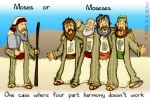
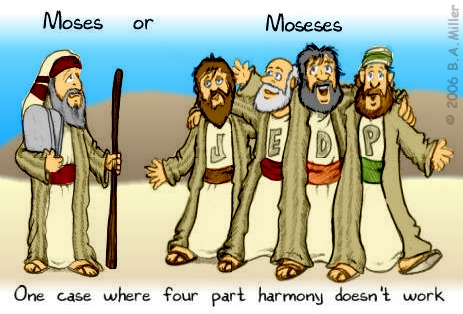
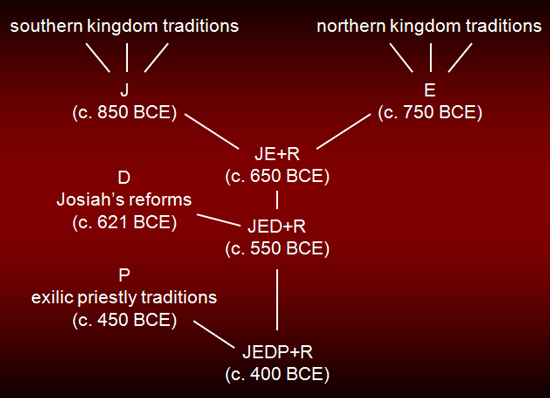
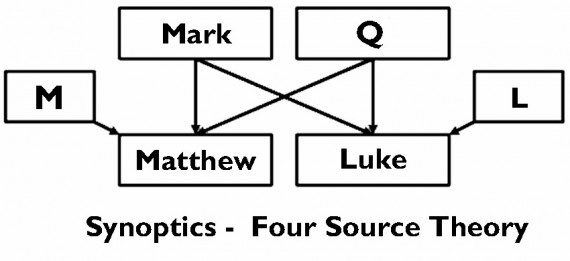
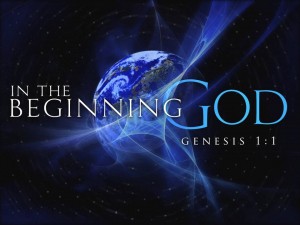 (As long as I am off in the weeds writing about scholarly conventional wisdom which I do not accept, I might as well include here that I also do not accept most of the canons of textual criticism which give priority to the Critical Text based on a few early documents rather than the Majority Text based on thousands of later documents…)
(As long as I am off in the weeds writing about scholarly conventional wisdom which I do not accept, I might as well include here that I also do not accept most of the canons of textual criticism which give priority to the Critical Text based on a few early documents rather than the Majority Text based on thousands of later documents…)
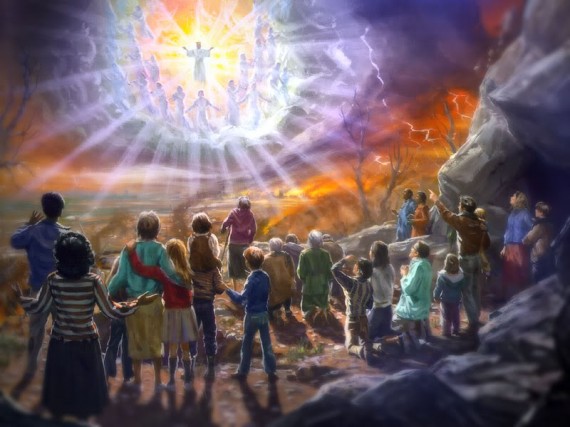
 I followed the word “traditional” above with question marks because although this view is traditional for me (it is what I have been taught for most of my life), I am not sure that this is the traditional view throughout all church history. I suspect that it is not.
I followed the word “traditional” above with question marks because although this view is traditional for me (it is what I have been taught for most of my life), I am not sure that this is the traditional view throughout all church history. I suspect that it is not. No, the Kingdom of God primary comes through giving cups of cold water, through speaking the truth in love, through loving, feeding, and clothing those who have less than we do, through hugs to the lonely, meals to the hurting, through being present with the broken.
No, the Kingdom of God primary comes through giving cups of cold water, through speaking the truth in love, through loving, feeding, and clothing those who have less than we do, through hugs to the lonely, meals to the hurting, through being present with the broken.